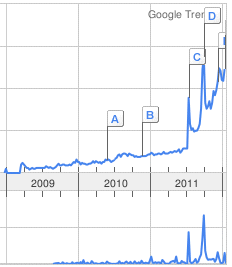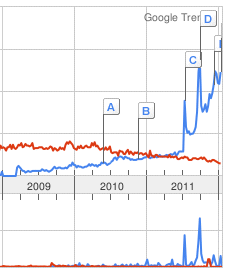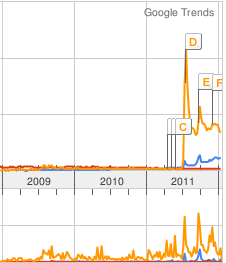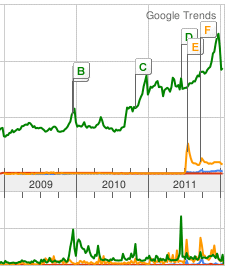 Analytics, Metrics and Music for the Radio Industry
Analytics, Metrics and Music for the Radio Industry
 An Indie Artist Pipeline to Internet Radio
An Indie Artist Pipeline to Internet Radio
 Radio Industry ROI Strategy
Radio Industry ROI Strategy
 A New Breed of Indie Artists
A New Breed of Indie Artists
Some Innovation in Radio Would Be Nice
I really do try to find a silver lining in the dark cloud that's been hanging over the radio industry these past few years. And, the thought that you - as a reader of these words - would like to see some positive movement reported is always present.
| "...little innovation gains little attention." |
It's not that I'm digging for dirt; on the contrary, this morning I went searching for something positive to write about. Visiting every radio industry trade, though, only turned up the same style of stories which have been printed for some time. We have:   Stations changing format Stations changing format  People moved in (and out) of employment People moved in (and out) of employment  A little mention about Blackberry introducing A little mention about Blackberry introducing an FM module to two of its smartphones an FM module to two of its smartphones  A couple of mentions about social media A couple of mentions about social media  Clear Channel's name change Clear Channel's name change  The constant message about producing quality content The constant message about producing quality content |
It's all standard fare in what's being served to people in radio today, and it lacks mention of innovation; changing how radio approaches programming or commercials. Can we just stop and digest what this means?
When was the last time you heard about a new approach to programming? Has any group introduced new concepts in delivering an advertiser's message to the masses recently? I'm not talking about copying a new media slant to ads, like couponing, but a serious attempt by radio to create something new. In 2011, was the science of analytics introduced, in any way, to a radio sales package?
By now we've all been exposed to the memo David Field wrote, (metaphorically) tying his family's recent safari to higher quality standards for Entercom employees. Whether it succeeded in motivating is questionable. I'll simply point to how ironic it is that Mr. Field uses Apple as an example of a company that produces "...'insanely great' products...", with no mention that it's Apple's ability to innovate that is behind this achievement.
Let me get one of my beliefs out of the way, quickly: Quality content is not going to be radio's savior anymore. Nor is locally originating content. There's just too much of both now.
Adaption to a changing media environment, like adding services that have become standard over this last decade by new competition, will add to radio's bottom line. (See "Demands on Radio Industry to Increase in 2012." Of course, if the objective is to only increase the bottom line, cutting expenses remains the other option - if there are any left to cut.
While it's abundant in hundreds of new media companies, innovation is a word that the radio industry has lost. Introducing "new" is something that doesn't happen in radio anymore. Simply copying "new," and applying it to radio is now the norm. Here's a brief example.
The most recent event that can be documented - besides Clear Channel's name change - is last September's iHeartRadio music festival, and its accompanying mega-promotion across 800+ CC stations. Let's compare charts to see how much effect that effort had.
Google Trends is not a precision methodology. There's no exact metrics applied. Instead it shows a comparison of search volume for specific keywords and, if you desire, it splits this geographically. (Read about Google Trends "scaling" here.)
Let's look at the search interest generated by iHeartRadio through its promotional period, up to today, in the USA, as defined by Google Trends.
Here's a color and impact key (the line next to each name), for the above charts.

If nothing else, these words are meant to show that little innovation gains little attention. And, to be clear, iHeartRadio is not innovative - it is the radio industry copying Pandora, then adding its own twist of listing broadcast radio stations.
Innovation is new, never before tried, something that makes the person on its receiving end go "that's different!" When is the last time you picked up a radio industry trade and read a story which made those words fall out of your mouth?
We've reached a time where the tried and true no longer draw. Quality radio means little in a sea of content that's, quickly, finding more online consumers. Producing a local quality radio program also holds less value than just a few years ago, due to the public having reached an intuitive use of the internet for local queries on information and entertainment.
Radio began a degradation at the onset of consolidation. Though the radio industry won't die, it did "jump the shark." (Defined at Wikipedia as "...indicating the moment in its evolution when a brand, design, or creative effort moves beyond the essential qualities that initially defined its success, beyond relevance or recovery.")
Unless/until innovation is reintroduced, radio is destined to strive to survive.
I'm not trying to serve you dirt on the radio industry. Honestly. It's just that, until we have some form of true innovation being reported within, there's not much else to talk about except a radio CEO and his family enjoying a jaunt into the wilds of Africa; then proudly proclaiming it as an epiphany of the work ethic - where all we have to do is "...bring our 'A' game." I wish it were that simple.
Wherever you work, is anything less than your "A" game ever acceptable?
Let's get back to being innovative! That's how you survive in the wilds.












